Former San Francisco mayor Gavin Newsom has used some of his time as California’s lieutenant governor to write a book, his first, on the data-driven, technology-enabled approach to civic engagement known as “Gov 2.0.”
Newsom uses the popular web simulation FarmVille as a way of understanding what he sees possible. In FarmVille, citizens can digitally divvy up their neighborhoods and amass points doing “real-life good.” More than a game, holds Newsom, “it’s a new way of thinking about the relationship between people and their government.” And it’s one particularly powerful for cities, “the places where the vast, seemingly intractable problems of our age will be solved.”
That gaming construct gives Newsom and co-author Lisa Dickey their title, Citizenville: How to Take the Town Square Digital and Reinvent Government. As a survey of the field, a reader could do worse. Newsom highlights a panoply of projects, from AmericaSpeaks’ “21st Century Town Meeting” to the federal government’s Blue Button for e-health records to the tiny Texas town of Manor, which has slapped barcode-like QR codes on local landmarks.
A warning, though: After 272 pages, you’ll know less about the ins and outs of civic technologies than you will Newsom’s complaints of how and by whom digital democracy is being thwarted. But that actually proves rather useful. Newsom is eager to spill about the, well, emotional challenges of reinventing local government in a way a more self-aware public servant might avoid.
There’s Care Not Cash, the San Francisco program, championed by Newsom, that replaced some direct monthly payments to homeless people with targeted public services. Salesforce’s Marc Benioff helped, Newsom writes, develop a cloud-based backend for intake. Critics complained about lost benefits and more. Writes Newsom, “One thing you never get used to as a politician is seeing yourself burned in effigy.”
There’s SF Stat, modeled on Baltimore’s CitiStat. Friday open meetings to talk about the data led to Saturday’s papers focused on the “5 percent [of the data] that showed something negative.” That cycle, writes Newsom, “wore down my staff and department heads to the point where we were having serious morale problems. It felt as though there was no positive incentive for having those open meetings.” They eventually stopped holding them.
There’s the San Francisco Chronicle’s criticism of his “benign” emails with Google’s Larry Page and Sergey Brin as they were starting talks on free city WiFi. “I cut back on using email,” Newsom writes, “a decision that certainly didn’t help productivity.” And then there’s an Examiner headline about Newsom’s extended-video State of the City address — “YouTube = MeBored” — that, he writes, “shows why most politicians are reluctant to put more than the minimum out for the public eye.”
It goes on. And if Newsom writes a second edition, he can add a review by the Los Angeles Times’ Robin Abcarian, who judges Citizenville “marred by Newsom’s streak of self-pity and self-serving explanations.” Adds Abcarian, “you’re either for transparency in government or you aren’t.”
Behind the scenes, other public officials will grumble about such black-and-white thinking. Newsom’s willing to grouse, at full volume, in public. “In asking public figures to release more information,” he writes, “we’re asking them to risk scorn and public ridicule. This is the number-one challenge of the open-data movement, in my opinion — the reason why it hasn’t taken off as it should. People are afraid to be skewered.”
“It’s a monumental mind shift to convince government bureaucrats and politicians of the positive power of this movement,” he continues. “But we must.”
Compared to others in public life, Newsom might be more sensitive than most. He’s certainly less filtered. But his unease about being on the cutting edge of open, participatory government isn’t the least bit unique. And Citizenville serves as a useful peek into the ego of someone actively engaged in worrying about both the future of democracy and the future of his career.

Nancy Scola is a Washington, DC-based journalist whose work tends to focus on the intersections of technology, politics, and public policy. Shortly after returning from Havana she started as a tech reporter at POLITICO.

.png)














